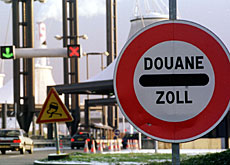Deiss urges moderation in escalating tax row

The economics minister, Joseph Deiss, wants the European Union to explain why it plans to slap new tariffs on Swiss re-exports as of March 1.
In an interview with swissinfo, he said the move was further complicating already difficult bilateral negotiations.
Brussels on Thursday said the new measure was simply a “clarification”. The measures apply to products and materials imported to Switzerland and subsequently exported back to the EU.
The EU’s move, which became public on Wednesday, was met by sharp criticism from the Swiss Business Federation, economiesuisse, which called it “an affront against Switzerland”.
Sceptics have also questioned whether the measures are designed to put pressure on Bern to give ground on stalled negotiations over a series of bilateral agreements with the EU, including an accord on the taxation of EU residents’ savings in Switzerland.
Deiss – who also holds this year’s Swiss presidency – said it was in the interests of both parties to find a resolution to the tariff row and break the deadlock on the bilateral negotiations.
swissinfo: Is the EU trying to put pressure on Switzerland to give ground on the continuing deadlock over stalled bilateral negotiations between Bern and Brussels?
Joseph Deiss: No, I don’t think so. The facts suggest that this is not the case and that the issue came up in another context. Even so, it’s not helpful to the bilateral negotiations, especially because we don’t understand the reasoning behind it. The tax goes against practices that have been in place for more than 30 years and I don’t understand how we’ve arrived at this result. We’re seeking an explanation and looking into ways to eliminate these new measures.
swissinfo: The Swiss Business Federation has said that the tariffs violate the 1972 Free Trade Agreement between Switzerland and the EU. Does this mean Switzerland can take legal action against the EU?
J.D.: There are institutions within the Free Trade Agreement that would be able to handle this case. Beyond that, we have to wait and see. We must find a solution and the EU must find a solution because [the measures] would only be harmful to both of us. The volume of cross-border traffic of products, which are produced with some parts in Switzerland and some parts in the EU, is so great that it’s in the interest of both sides to find a solution.
swissinfo: Earlier this week, you travelled to Dublin to meet EU officials concerning the stalled bilateral talks but your visit failed to break the deadlock. Do you believe either side is prepared to budge and what will Switzerland’s next step be?
J.D.: We have to keep quite cool. This is a normal situation within these types of negotiations. And keep in mind that seven out of nine bilateral treaties have been successfully negotiated. What we need now is to come down to earth and reach a political consensus on the other two.
swissinfo: But Switzerland and the EU have been at an impasse over this issue for some time now.
J.D.: We’ve been talking about these agreements for two years now, so it’s not that long of a period. There may be some pressure now because the EU is very interested in putting into practice the agreement on the taxation of EU residents’ savings.
They want to do this in January 2005 and if they want to do it at that moment, we have to reach an agreement by the middle of this year. Even if we could reach an agreement now, for Switzerland to implement it would take a certain amount of time.
I can understand that the EU is becoming more nervous and that’s why we believe that if it’s really important to them to reach an agreement, there’s not that far to go in order to give us what we want on other topics.
swissinfo-interview: Anna Nelson in Geneva

In compliance with the JTI standards
More: SWI swissinfo.ch certified by the Journalism Trust Initiative











You can find an overview of ongoing debates with our journalists here . Please join us!
If you want to start a conversation about a topic raised in this article or want to report factual errors, email us at english@swissinfo.ch.